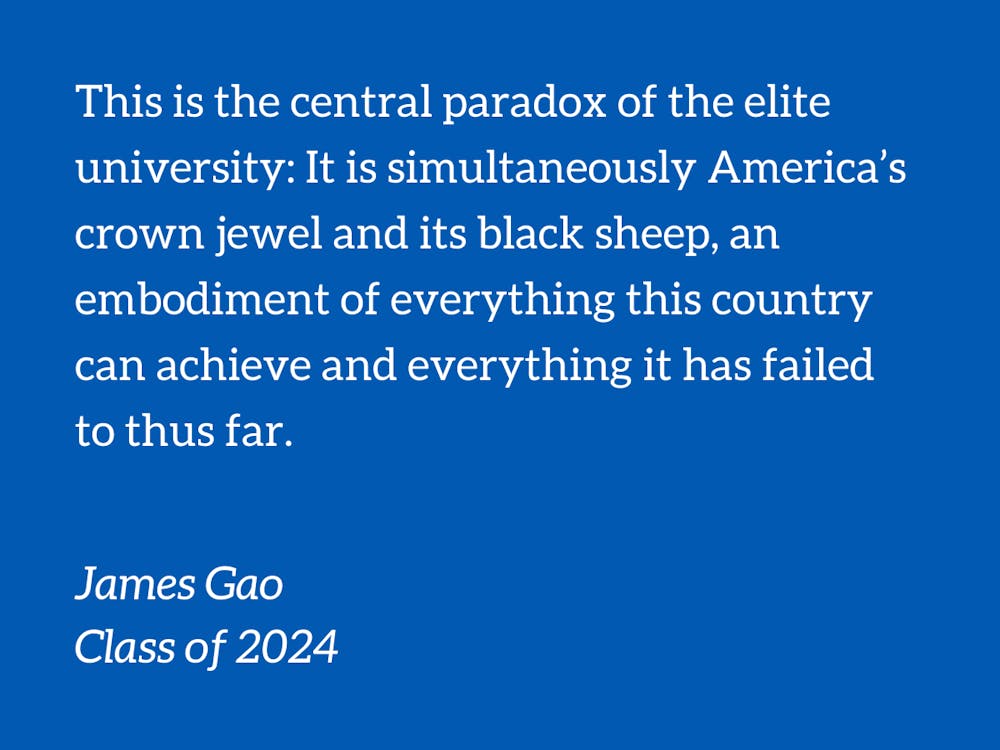American universities are not having their best moment, to say the least. College enrollment is in free fall. Last year, a Wall Street Journal survey found that nearly 60% of Americans are skeptical of the value of a four-year degree — a 16-point swing from a decade prior. Perceived inadequacy in responding to antisemitism led to University of Pennsylvania president Liz Magill stepping down; Harvard president Claudine Gay was also forced to resign (but not before providing the world a timely reminder of what constitutes plagiarism). All of this occurred mere months after a Supreme Court ruling overturned race-conscious admissions and exposed many of the structural flaws embedded in the college admissions system.
Even as Duke and its peers face a growing swell of critics, we cannot feign indifference toward their futures. The Ivies, Stanford, MIT, Chicago and Duke enroll less than 0.5% of Americans, but graduates from these 12 universities make up “more than 10% of Fortune 500 CEOs, a quarter of U.S. Senators, half of all Rhodes scholars, and three-fourths of Supreme Court justices.” The prestige of a university matters, and it matters because we have long believed that it should matter. These schools represent our hopelessly optimistic yet unyielding faith in meritocracy. They carry the American Dream on their backs.
Yet the qualities that make the university the apotheosis of upward mobility also make it an easy target for attacks from across the political spectrum. In right-wing circles, pundits challenge diversity, equity, and inclusion (DEI) policies and castigate campuses as “Marxist indoctrination camps.” On the left, politicians have taken aim at admissions policies that privilege the rich, such as legacy preferences. In a polarized society, Republicans and Democrats may disagree on what ails us, but they can agree on one thing — universities are partly to blame.
Take, for example, a bipartisan bill introduced in the House in December that denies federal student loans to any student that attends an elite private college like Duke. The Chronicle previously reported that this will impact 3,400 students at Duke who receive federal loans. If this legislation passes, it will merely create an additional obstacle in an environment that low-income students already struggle to navigate. Congress is, in effect, reaching to use private schools’ budgets as a piggy bank for problems that they cannot solve on their own.
The House’s proposed student loan changes point toward a difficult truth: We are simply asking too much of our schools. Critics in Congress and the media cannot decry elite schools’ lack of socioeconomic diversity in one breath, and then strip away a vital means of improving it in the next. In a similar vein, conservatives have spent years lamenting the degradation of free speech policies on college campuses. Yet, university presidents’ commitment to those exact policies came back to haunt them when they were called to testify before Congress regarding antisemitism and responded to difficult questions like, “Does calling for the genocide of Jews violate your school’s code of conduct?”, with, “It depends.” Certainly, their answers were unsatisfactory. But the inevitable result of attempting to please everyone is pleasing nobody. This is the central paradox of the elite university: It is simultaneously America’s crown jewel and its black sheep, an embodiment of everything this country can achieve and everything it has failed to thus far.
Our eagerness to scapegoat colleges is making it harder to introspect on the pervasiveness of the challenges we face. Antisemitism and debates about DEI and free speech rage viciously outside of the university campus. The overrepresentation of upper-class and white students in elite schools stems from systemic problems in our educational system. The flaws of the university reflect a flawed society — one that struggles to grapple with difficult issues like inequality, intolerance and meritocracy. It is easy to blame Harvard for societal ills and hard to implement systemic change.
Supporting rich, powerful institutions will not make you many friends; I want to be clear that this is not a blind defense of schools like Duke. University leaders should be held responsible for their failures. They should be condemned for policies that protect their self-interest at the expense of the common good. Nonetheless, it has become fashionable to denigrate the university and unfashionable to think it can do better. We must distinguish between those who criticize our schools because they value them and those who are praying for their downfall. You don’t need to love your university, but you should believe that its campus is worth fighting for.
James Gao is a Trinity senior. His column typically runs on alternate Fridays.
Get The Chronicle straight to your inbox
Signup for our weekly newsletter. Cancel at any time.

